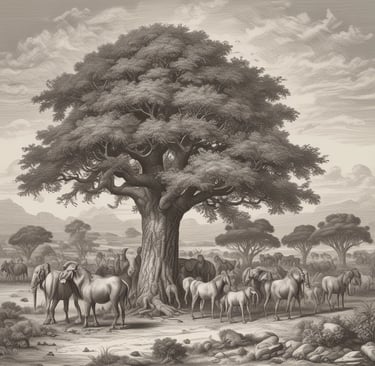The Diaspora Dilemma: Have We Traded Our Culture for Acceptance?
What happens when a community stops supporting itself? In this blog, I address the lack of unity among Africans in the diaspora, how we compare to other immigrant groups, and why we need to start lifting each other up instead of tearing each other down.
Adebola Badiru
2/19/20253 min read


Good morning, guys. Today, I want to talk about something that’s been weighing on my mind for a while—the lack of unity among Africans in the diaspora.
Now, when you look at other immigrant communities—Indians, Pakistanis, Chinese, Arabs—you can see a pattern. They help each other grow. They build businesses together, support one another in the workplace, and create a strong sense of belonging no matter where they are. But when it comes to us Nigerians—or even Africans in general—it often feels like the opposite. There’s no sense of community. Instead of lifting each other up, we seem to be in constant silent competition, full of mistrust, tearing each other down rather than pushing forward together.
Why is that? Where did we go wrong?
One of the things I’ve noticed is how quickly we discard our culture when we move abroad. Back home, respect for elders is second nature. You see someone older, you greet them properly. You acknowledge their presence with respect. But the moment we step into the Western world, that all seems to go out the window. Suddenly, we’re calling people twice our age by their first names because, well, that’s what everyone else is doing. Meanwhile, other cultures—Asians, Arabs, even some Caribbean communities—hold onto their values with pride while still integrating into society.
It’s not about refusing to adapt. Of course, we should evolve with our environment. But adaptation doesn’t mean erasing who we are. Other immigrant communities pick the best aspects of Western culture while holding onto their traditions. But for some reason, we tend to do the opposite—we let go of the parts of our culture that define us and adopt only what seems convenient.
And it’s not just about respect. It’s about how we raise our children too. I recently heard a story about a Nigerian mother in the UK whose 15-year-old daughter slapped her. Let’s be honest—would that happen back home? Highly unlikely. But here, things are different. Suddenly, discipline is "child abuse." Setting firm boundaries is seen as "harsh parenting." And before you know it, we’re raising kids who don’t understand the value of respect, responsibility, or even their own heritage.
I find it funny that we’re so quick to let go of our language, our traditions, even the way we speak. Have you seen the video of Nigerian kids being taught British accents in school? That was one of the most ridiculous things I’ve ever seen. Since when did an accent determine someone’s intelligence? Instead of nurturing their identity, we’re teaching them to erase it. And for what?
Meanwhile, look at other communities. Look at the statistics. The highest academic achievers in the UK? Asians. The highest-earning immigrant group in the U.S.? Asians. The most financially powerful minority communities? The Jewish community stands out. What do they all have in common? Unity. Family structures that remain strong. A deep sense of self-worth that comes from knowing exactly who they are.
And then there’s us. Competing with one another at every turn, refusing to support each other’s businesses, dragging down anyone who dares to rise. Even in the workplace, the biggest stumbling block to a Nigerian’s progress is often another Nigerian. I’ve seen it happen too many times.
I know some people will say, “Well, where has our culture taken us? Look at Africa, look at our problems.” But let’s be honest—our culture isn’t the issue. The problem is governance, not values. Nigerians who get the right opportunities thrive in every field, whether it’s tech, business, or medicine. Our resilience, intelligence, and innovation aren’t the problem. It’s our mindset towards one another that’s holding us back.
We need to do better. We need to stop seeing each other as enemies. We need to stop thinking that another Nigerian’s success takes something away from us. We need to start raising children who understand where they come from, who respect their roots while thriving in whatever society they find themselves in.
Because if we don’t fix this now, if we don’t rebuild our sense of unity and community, we will keep struggling—no matter how long we stay abroad.
Explore my journey as a physiotherapist leader.
© 2025. All rights reserved.
